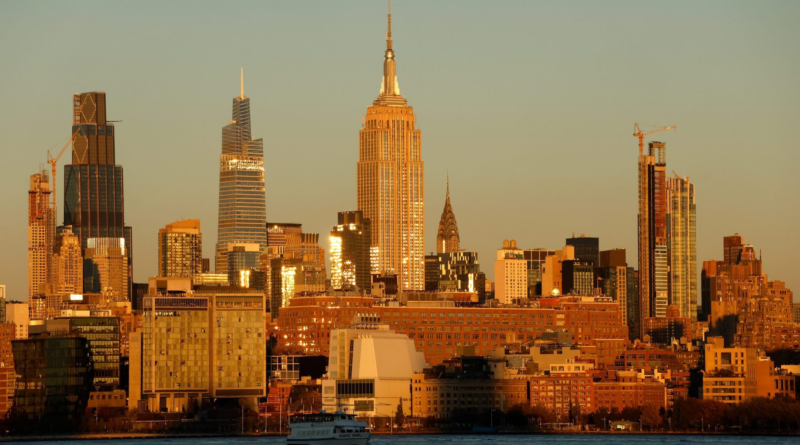How New York transformed from tech backwater into global venture capital
When Kevin Ryan went out to raise money for DoubleClick in 1996, every California venture capital firm he spoke with told him they would love to invest—if he moved to San Francisco. He couldn’t bring himself to leave New York, especially because his burgeoning startup benefited from being close to its clients of advertising agencies. “It was the right place to be,” he tells me.
The bet paid off, and DoubleClick grew from 10 employees to 2,000 in four years. Ryan went on to found a string of New York companies—MongoDB, Zola, Gilt, and Business Insider—along with his own venture firm, AlleyCorp. He’s rightfully earned the title of the “Godfather” of the New York tech, which most would argue he shares with Union Square Ventures’ Fred Wilson. And what about the VCs who turned Ryan down for DoubleClick? “Every one of those firms has opened a VC office in New York now,” he says.
The mythos of Silicon Valley should be familiar to Term Sheet readers: the “traitorous eight,” the myriad garages, the emergence of Sand Hill Road, the cycle of exits and new legions of founders. It is decades old and steeped in legacy. But the story of New York’s tech scene is just beginning. “I’m a first generation, like at the very beginning, and I’m still in the mix,” Ryan tells me.
I have been lucky enough to call New York home for 15 years, moving here just a few years after Google acquired DoubleClick for $3.1 billion in 2007. That was the same year the search behemoth moved into Chelsea Market, later taking over an entire city block. But for years, tech remained an afterthought. “A bit of a backwater,” as BoxGroup founder David Tisch puts it to me. “Getting attention for anything in this city is hard.”
So when did that change? It happened in fits and starts. DoubleClick found success in the ‘90s, alongside Fred Wilson, who founded his first venture firm Flatiron Partners in 1996. But the dot-com bubble wiped out progress. Eventually, the upward march resumed, with Wilson founding Union Square Ventures in 2003 and DoubleClick finding its monster exit soon after.
By Tisch’s estimation, the 2008 financial crisis actually helped the nascent scene by upending the city’s incentive structure and pushing “smart people” into tech. Tisch got serious about angel investing in 2009, starting the New York wing of the Techstars incubator the next year. He knew the scene was taking off when he hosted its first demo day at Webster Hall in 2011. He looked out from the stage and saw tier 1 San Francisco VCs that had flown out. “It felt like there was a moment of growth in New York.”
The “next Silicon Valley” is a futile term conjured up by reporters and editors hoping to pattern-match for a story (it’s not just you, VCs), and it doesn’t really make sense for New York, which is a city often tritely defined by its patchwork of people and sectors. Monoculture is essential for Silicon Valley, where you live, breathe, and sleep tech. New York’s diversity breeds apathy toward any single industry’s supremacy, which is probably why so many tech people want to move here in the first place. It’s nice not having to hear a startup pitch every waking moment of your life.
While no one is arguing that New York can challenge Silicon Valley for the throne of tech hub, Ryan still thinks we might get there in 10 years. And for now, New York has the undisputed claim to second place, especially for venture capital, with homegrown firms from AlleyCorp to BoxGroup, and from Union Square Ventures to Thrive Capital. New York still has yet to mint its own Oracle, Google, or Meta, but it has created generation-defining companies like Foursquare, Tumblr, and Kickstarter that didn’t quite make it, along with an unsexy crop that did, like MongoDB and Datadog.
New York has Wall Street, many of the country’s top hospitals, and is the fashion and design capital of the country. It’s no coincidence that you have Uniswap and Ramp; Flatiron Health and Oscar; and Etsy and Glossier. But increasingly, it seems like New York has the critical mass of tech talent to produce that necessary cycle of exits and founders. Ever the booster, Ryan even challenged the truism that San Francisco is the better city for AI.
I want to use this weekly edition of Term Sheet to explore the booming startup and venture scene here, where the city shapes the people and companies more than the inverse. But I’m not looking to deem New York as the next anything. “There’s no championship given out in startup land,” Tisch says. He finds any idea for a tech rivalry among cities strange. But really, that’s the most New York attitude you can have. What’s there to compete for? I tell him that San Francisco has better burritos. “But we have better everything else,” he says. “There you go, you got my quote.”
Scoop…Three veterans of the venture arm of Two Sigma, the secretive New York investment firm, are raising a $25 million crypto venture fund with backing from senior executives, according to a regulatory filing and sources. You can read more here.
Leo Schwartz
Twitter: @leomschwartz
Email: leo.schwartz@fortune.com
Submit a deal for the Term Sheet newsletter here.
Nina Ajemian curated the deals section of today’s newsletter. Subscribe here.
VENTURE DEALS
– Jupiter Bioventures, a San Francisco-based biotech venture foundry, raised $70 million in funding from Alexandria Venture Investments, Bioventure Partners, Cedars-Sinai Intellectual Property Company, existing investors Mission BioCapital, Mayo Clinic, and others.
– Nivoda, a London-based digital marketplace for the diamond industry, raised $51 million in funding. Northzone led the round and was joined by existing investors Avenir, Headline, Abstract Ventures, and Canaan Partners.
– Agicap, a London-based treasury management platform, raised €45 million ($47.2 million) in Series C funding from AVP.
– Medeloop, a Menlo Park, Calif.-based medical research AI platform, raised $15.5 million in Series A funding. Inovia Capital led the round and was joined by Icon Ventures, Healthier Capital, Up2 Opportunity Fund, CFO Advisors, and existing investors General Catalyst and Maven Ventures.
– Candela, a Stockholm-based hydrofoiling electric vessels developer, raised $14 million in Series C funding. SEB Private Equity led the round and was joined by existing investors EQT Ventures and KanDela AB.
– METRON, a Paris-based energy optimization solutions provider, raised €12.5 million ($13 million) in funding. GET Fund led the round and was joined by existing investors BNP Paribas, Climate Investment, and Vertigo.
– Outsmart Education, a remote college education accessibility and affordability company, raised $13 million in seed funding. Khosla Ventures led the round and was joined by Karman Ventures, Latitud Ventures, Lightspeed Ventures, and angel investors.
– Epic Cleantec, a San Francisco-based water reuse technology company, raised $12 million in Series B funding. The family office of Drs. Kathy Fields and Garry Rayant led the round and was joined by existing investors J-Ventures, Echo River Capital, and others.
– OceanWell, a Menlo Park, Calif.-based fresh water production technology developer, raised $11 million in Series A funding from Kubota, the family office of Jon Hemingway of Carrix Ports, and Charles McGarraugh.
– Keto Software, a London-based strategic portfolio management solutions provider, raised €6.4 million ($6.7 million) in funding. Emerald Technology Ventures led the round and was joined by Greencode Ventures, Ilkka Brotherus, and Kimmo Rauma.
– Cofactor AI, a Chicago-based claims denials platform for hospitals, raised $4 million in seed funding from Drive Capital.
– Tempest, a San Francisco-based complete developer platform, raised $3.2 million in seed funding. Abstract Ventures led the round and was joined by Box Group, Background Capital, Max Mullen, and others.
PRIVATE EQUITY
– Apica, backed by The Riverside Company and others, acquired Orson, an El Segundo, Calif.-based test data orchestration platform. Financial terms were not disclosed.
– BTTC, a Manchester, England-based infrastructure consultancy, merged with Cumming Group, a New York City-based project management and cost consultancy backed by New Mountain Capital and Tailwind Capital. Financial terms were not disclosed.
– Horwitz, backed by Svoboda Capital Partners, acquired Preferred Electric, a Minneapolis-based commercial and industrial electrical contractor. Financial terms were not disclosed.
– Marrinan Group, a portfolio company of Keswick Partners, acquired KH Sports Fan, Plainfield, Ill.-based collegiate products manufacturer, and Kindred Hearts, a Plainfield, Ill.-based home goods manufacturer. Financial terms were not disclosed.
– Protective Industrial Products, a portfolio company of Odyssey Investment Partners, agreed to acquire the personal protective equipment business of Honeywell, a Charlotte, N.C.-based technology developer for the safety, security, energy, and other sectors, for $1.3 billion in cash.
– Stonepeak acquired Arvida, an Auckland, New Zealand-based retirement and aged care provider. Financial terms were not disclosed.
OTHER
– Recursion, a Salt Lake City-based drug discovery biotech, merged with Exscientia, an Oxford, England-based drug designer and developer. Financial terms were not disclosed.
PEOPLE
– Brightstar Capital Partners, a New York City-based private equity firm, added Charles Yoon as a managing partner and Kevin Deemer as a managing director. Previously, Yoon and Deemer were at Bregal Partners.
– Pear VC, a Menlo Park, Calif.-based venture capital firm, added Annie Ta as head of founder and startup ecosystem. Previously, she was at Penknife Collective.
– Quinbrook Infrastructure Partners, a London-based investment manager, added Predrag Dukic as a senior director, Nick Baker as a senior director, and Liv Miller as a director. Previously, Dukic was at DC Placement Advisors, Baker was at BAES Infrastructure, and Miller was at Statkraft.




